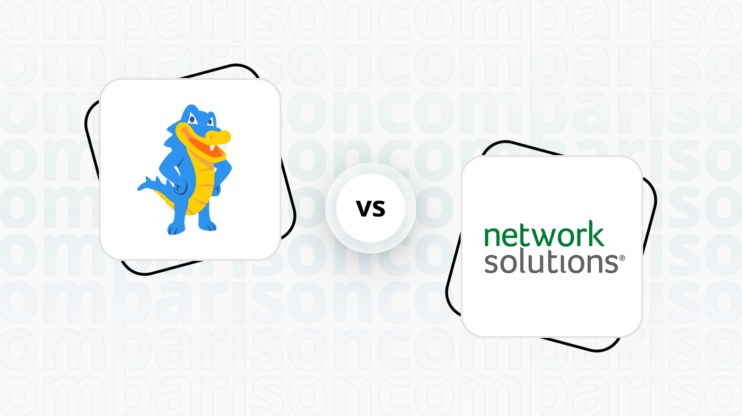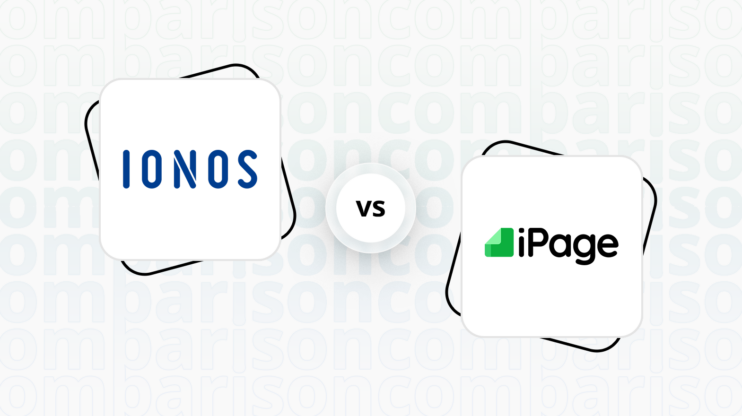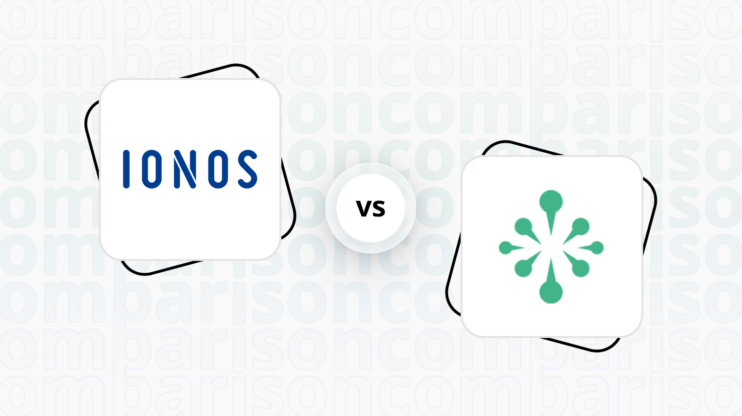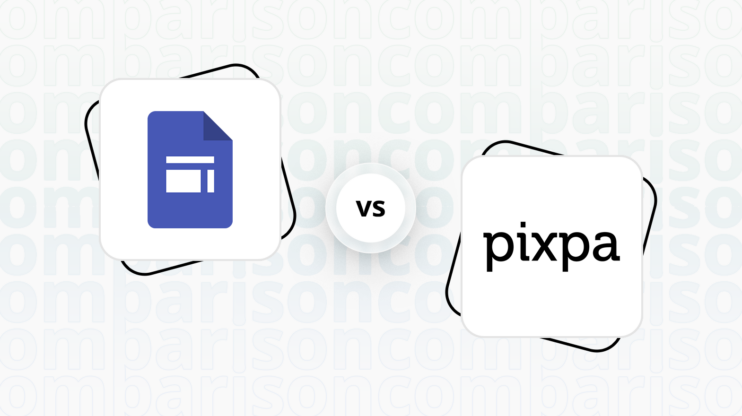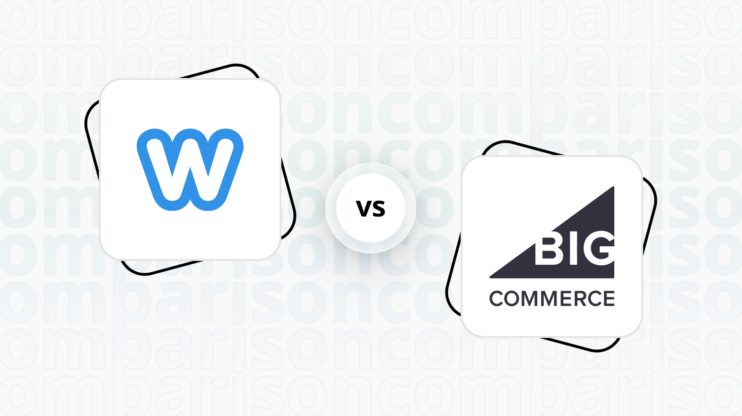Final verdict
WordPress and Sellfy both offer unique advantages, but they cater to different user needs and preferences.
-
WordPress (Overall Grade: 7.1/10)
is a versatile open-source CMS that excels in customization and flexibility. It is ideal for users who need extensive design functionalities, a wide range of plugins, and robust ecommerce capabilities through WooCommerce. When comparing WordPress vs Sellfy, WordPress stands out for its comprehensive learning resources, advanced website speed optimization tools, and strong user management features. However, it requires a steeper learning curve and additional purchases for hosting and domain. -
Sellfy (Overall Grade: 6.0/10)
is an all-in-one ecommerce platform tailored for creators looking for simplicity and ease of use. It is perfect for users who want a quick setup without advanced technical skills. In the WordPress vs Sellfy comparison, Sellfy offers a more straightforward pricing structure, built-in hosting, and strong customer support. While it may lack the extensive customization options of WordPress, Sellfy provides a user-friendly interface and essential ecommerce features, making it a great choice for small businesses and individual creators.

|

|
|
|---|---|---|
|
Design functionalities & templates |
9.0 |
5.2 |
|
Ease of use |
7.2 |
7.8 |
|
Ecommerce |
8.4 |
6.8 |
|
Website Editors |
8.5 |
6.8 |
|
Product testing options |
8.1 |
7.3 |
|
Price |
5.9 |
7.9 |
|
Hosting quality |
0 |
7.3 |
|
Website speed optimization |
6.5 |
5.4 |
|
Plugins and integrations |
8.8 |
6.7 |
|
Marketing features |
8.0 |
7.1 |
|
Customer support |
5.0 |
5.8 |
|
Security |
6.7 |
7.2 |
|
AI capabilities |
6.1 |
0 |
|
User Management |
8.8 |
2.0 |
Best for ecommerce
 8.4
8.4
 6.8
6.8
Verdict
: WordPress offers extensive customization and flexibility, making it ideal for complex ecommerce needs, while Sellfy provides a simpler, more streamlined experience for creators.
-
WordPress
: With its WooCommerce integration, WordPress is a robust and customizable ecommerce solution. It supports multiple payment gateways, abandoned cart recovery, ecommerce analytics, SEO optimization tools, and an extensive plugin ecosystem. This makes it suitable for businesses looking for flexibility and scalability. However, when comparing WordPress vs Sellfy, WordPress may require more technical skills to fully leverage its capabilities. -
Sellfy
: Designed for creators, Sellfy offers a user-friendly platform for selling physical products, digital goods, and subscriptions. It features built-in marketing tools, content security measures, and supports payment processing via Stripe and PayPal without additional transaction fees. While it may lack the extensive customization options of WordPress, it excels in providing a straightforward ecommerce experience.
Best for informational & business websites
 9.2
9.2
 5.7
5.7
Verdict
: WordPress is the superior choice for informational and business websites, offering extensive customization options and a vast array of plugins. Sellfy, while user-friendly, is more tailored towards ecommerce and may not provide the same level of flexibility for informational sites.
-
WordPress
: With a score of 9.2, WordPress excels in creating highly customizable and feature-rich informational websites. Its open-source nature and extensive plugin ecosystem make it ideal for users seeking flexibility and control over their site’s design and functionality. WordPress is particularly well-suited for blogs, business sites, and other content-driven websites, providing a robust platform for a wide range of informational needs. -
Sellfy
: Scoring 5.7, Sellfy is primarily an ecommerce platform designed for creators selling digital and physical products. While it offers a simple and user-friendly interface, it lacks the extensive customization options and flexibility that WordPress provides. Sellfy is best suited for users who prioritize ease of use and quick setup over advanced design and functionality. When comparing WordPress vs Sellfy, Sellfy’s strengths lie in ecommerce rather than informational websites.
Detailed comparison
Design functionalities & templates
Design FunctionalitiesRepresents how well each platform allows for creative design and customization of websites.Score Components:
- Template Variety (30%): Range and quality of design templates.
- Customization (30%): Flexibility and options for design alterations.
- User Interface (20%): Ease and intuitiveness of the design process.
- Responsiveness (10%): Adaptability to different devices and screen sizes.
- Innovation (10%): Unique design features and tools.
 9.0
9.0
 5.2
5.2
🏆
Winner: WordPress.
If you’re looking for a platform that offers extensive customization options and a wide variety of templates and designs, WordPress is the preferred choice.
WordPress offers an extensive variety of templates and designs, catering to a wide range of website types beyond just blogs or ecommerce. Its open-source nature allows for high customization and creative freedom, appealing to diverse user needs. While WordPress itself doesn’t sell premium templates, numerous third-party theme shops offer sophisticated and specialized design choices, expanding the possibilities for users.
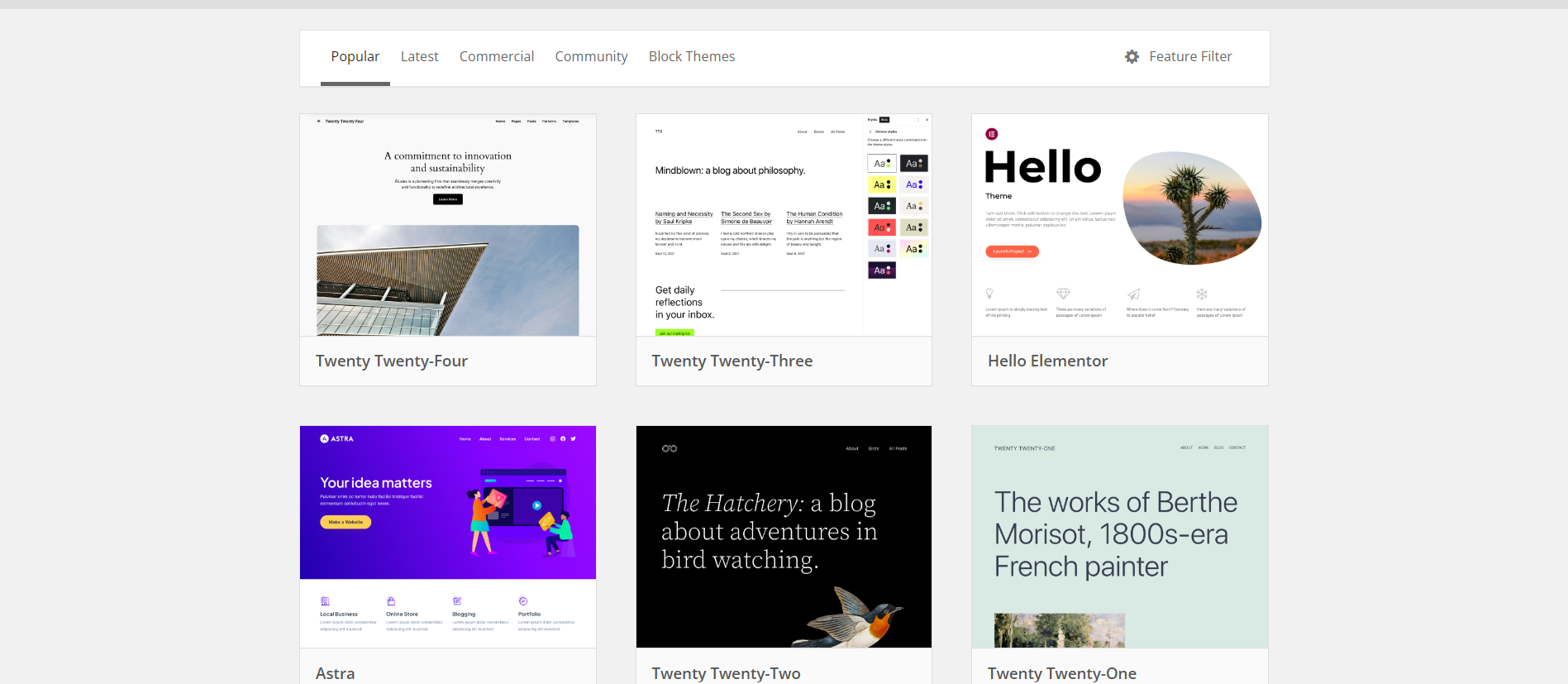

Compared to WordPress, Sellfy provides a collection of design templates through its theme store, located in the Store Customizer. Users have the option to preview these themes before applying them to their websites. As of the latest information, Sellfy offers five main theme options: Lumi\u00e9re, Noir, Savant, Id\u00e9e, and Mode. These themes cater to various aesthetic preferences and can be published to go live on a user’s website after selection and customization.
Get a head start on website creation with AI
Create a custom website tailored to your business needs 10X faster with 10Web AI Website Builder!
Ease of use
Ease of useReflects the platform’s overall user-friendliness.Score
Components:
- Learning curve (40%): Quickness and ease of getting started.
- Interface design (30%): Simplicity and intuitiveness of layout.
- User guidance (20%): Quality of tutorials and support.
- Flexibility (10%): Adaptability to various user skills.
 7.2
7.2
 7.8
7.8
🏆 Winner: Sellfy
. With a score of 7.8, Sellfy edges out WordPress (7.2) in terms of ease of use. Sellfy’s user-friendly interface and straightforward website builder make it a more accessible choice for creators and small business owners without advanced technical skills. However, WordPress offers greater flexibility and customization options, making it a powerful tool for those willing to navigate its steeper learning curve.
Learning Resources
🏆 Winner: WordPress
. WordPress is supported by a vast array of learning resources, including detailed documentation, community forums, online tutorials, and courses. This extensive support network is beneficial for users of all skill levels, from beginners learning the basics to advanced users seeking to enhance their expertise.
For ecommerce
EcommerceMeasures the platform’s effectiveness in supporting online business activities.Score Components:
- Ecommerce themes and templates (20%): Variety and design of templates.
- Product management (25%): Ease of managing and organizing products.
- Payment options (25%): Variety and convenience of payment methods.
- Ecommerce features (20%): Features for managing an ecommerce store.
- Integration (10%): Compatibility with external e-commerce tools and services.
 8.4
8.4
 6.8
6.8
When it comes to ecommerce, both WordPress and Sellfy have their strengths. WordPress, with its WooCommerce plugin, offers a robust and customizable ecommerce solution. It supports multiple payment gateways, abandoned cart recovery, ecommerce analytics, SEO optimization tools, and an extensive plugin ecosystem. On the other hand, Sellfy provides a user-friendly platform designed for selling physical products, digital goods, and subscriptions. It features built-in marketing tools, content security measures, and supports payment processing via Stripe and PayPal without additional transaction fees.

|

|
|
|---|---|---|
|
Ecommerce themes and templates |
9.2 |
7.0 |
|
Product page customization |
9.0 |
6.5 |
|
Payment processing and commissions |
7.5 |
8.0 |
|
POS capabilities |
6.5 |
4.0 |
|
Payment gateways |
8.5 |
6.0 |
|
Product numbers |
7.0 |
7.5 |
|
Additional ecommerce features |
8.0 |
6.5 |
WordPress ecommerce features:
- WooCommerce Integration
- Multiple Payment Gateway Support
- Abandoned Cart Recovery
- Ecommerce Analytics
- SEO Optimization Tools
- Extensive Plugin Ecosystem
Sellfy ecommerce features:
- Product Listings
- Payment Gateways integration
- Product categories
Ecommerce themes & templates
WordPress offers hundreds to potentially thousands of ecommerce and WooCommerce specific themes and templates, both free and premium. This gives users a wide range of options for customizing the look and feel of their online store. Sellfy, on the other hand, offers templates that are specifically designed for online stores.
Product page customization
WooCommerce on WordPress offers extensive customization for ecommerce product pages, including product images, descriptions, add-to-cart buttons, product tabs, upsells, and related products. Sellfy supports a diverse range of products including digital goods, physical products, and print-on-demand merchandise. It also provides tools for product protection and piracy prevention.
Payment processing
WordPress doesn’t handle payments directly but offers plugin options for payment processing, including popular gateways like PayPal, Stripe, Authorize.Net, and Square. Sellfy supports two primary payment gateways, Stripe and PayPal, and does not charge transaction fees beyond its subscription cost.
In conclusion, while WordPress offers more flexibility and customization options, Sellfy provides a simpler, more streamlined ecommerce experience. The choice between the two will depend on your specific needs and technical skills.
Website Editors
Website EditorsEvaluates the platforms’ website building and editing capabilities.Score Components:
- Customization tools (40%): Range and power of editing features.
- Editor usability (30%): User experience within the editor.
- Design flexibility (20%): Freedom in layout and design changes.
- Update and maintenance ease (10%): Simplicity of updating and maintaining the site.
 8.5
8.5
 6.8
6.8
🏆
Winner: WordPress
. WordPress, with a score of 8.5, offers a user-friendly interface with block-based editing, extensive styles customization, template management, page editing/creation, distraction-free modes, versatile saving options, and accessibility for users of varying skill levels. It provides a WYSIWYG (What You See Is What You Get) interface, and changes can be applied globally, including Header and Footer templates. The editor also offers features like undo/redo, List View, Command Palette, and customization tools.
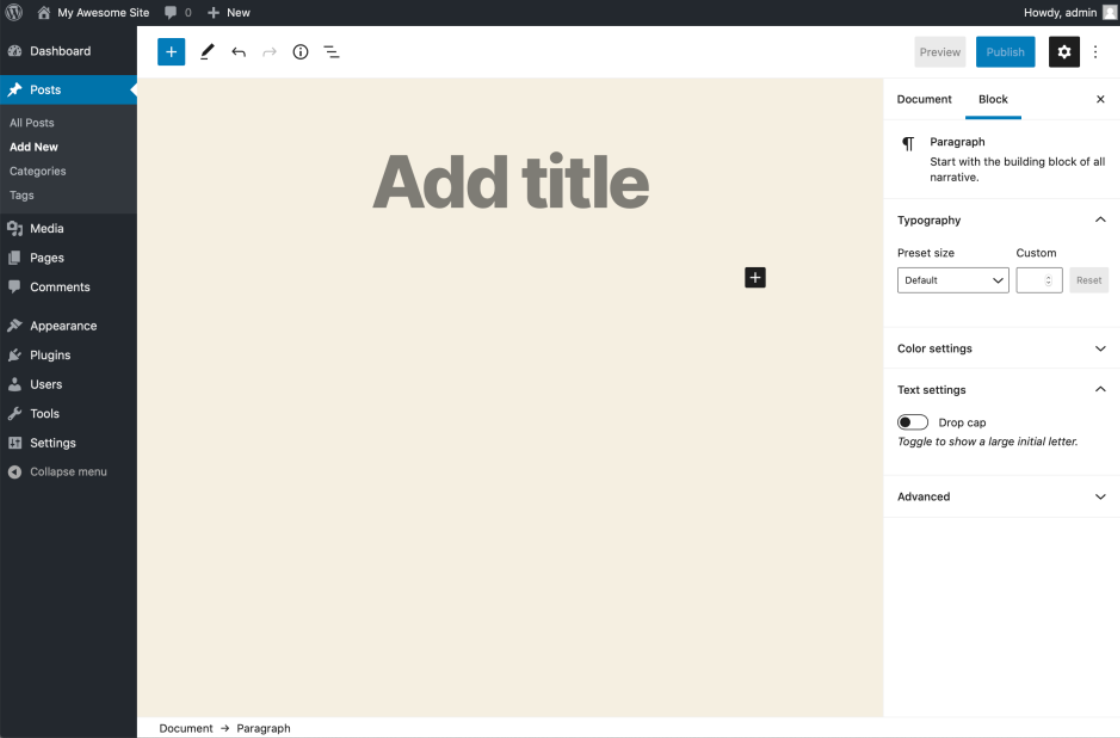
Sellfy’s editor, scoring 6.8, offers a straightforward and user-friendly platform for creating online stores, focusing on simplicity over advanced customization. It supports the sale of digital, physical, subscription-based, and print-on-demand products, alongside integrated marketing tools for promotion and sales optimization. However, its simplicity might be limiting for those seeking advanced customization and extensive integrations.
Mobile editor/app
 8.1
8.1
 7.5
7.5
🏆
Winner: WordPress
. Both WordPress and Sellfy offer mobile apps for managing your website, but they cater to different needs. WordPress’s mobile app allows you to create and edit posts, manage comments, schedule content, and analyze website traffic from your phone or tablet. While it offers convenience and basic functionality, it has some limitations compared to the web-based editor, including fewer advanced options, restricted code access, and limited design customization.
Sellfy’s mobile app, on the other hand, is more focused on ecommerce. It enables store owners to manage their online stores on the go, offering functionalities such as viewing store performance metrics, managing and tracking orders, and receiving customized notifications. Users can also access summary reports of their store’s performance on a daily, weekly, or monthly basis. However, it’s not possible to change the layout or the design of the website itself.
In summary, while both apps offer useful features for managing your website on the go, WordPress’s mobile app has a slightly higher score due to its broader range of functionalities.
Product testing options
Product Testing OptionsAssesses the options for trying out platform features before commitment.Score Components:
- Trial quality (40%): Extent and usefulness of the trial or free version.
- Feature accessibility (30%): How many features are available to test.
- Trial duration (20%): Length of the trial period.
- Ease of transition (10%): Smoothness of moving from trial to paid plans.
 8.1
8.1
 7.3
7.3
Overall Result
:
WordPress wins
. WordPress scores 8.1 in product testing options, slightly higher than Sellfy’s 7.3. WordPress, being an open-source CMS, offers a free version but does not provide a trial version or the possibility to test premium features. Sellfy, on the other hand, does not offer a free version but provides a 14-day free trial during which premium features can be tested. Sellfy also offers a 30-day money-back guarantee.

|

|
|
|---|---|---|
|
Free Plan |
Yes (open source software) |
No |
|
Trial Duration |
No |
14 days |
|
Testing Premium Features |
No |
During the free trial |
Price
PriceLooks at the cost-effectiveness and value for money of each platform.Score Components:
- Plan value (40%): What each pricing tier offers.
- Transparency and clarity (30%): Clearness of pricing structures.
- Flexibility of plans (20%): Range of options to suit different budgets.
- Hidden costs (10%): Additional expenses not included in the plan.
 5.9
5.9
 7.9
7.9
Sellfy offers a more straightforward pricing structure with clear features and benefits for each tier, while WordPress is free but requires separate purchases for hosting, domain, and website builder subscriptions.

|

|
|
|---|---|---|
|
Free |
Free Plan ($0/month): WordPress is open source software that is free. WordPress does not provide hosting services; so, it is necessary to purchase a domain, web hosting, and website builder subscriptions separately. While WordPress lacks built-in ecommerce, plugins like WooCommerce offer a solution. WordPress offers an extensive variety of templates and designs. WordPress lacks a built-in AI-assisted builder, but its open-source nature allows for an ecosystem of plugins and themes incorporating AI for website building. |
No offering at this amount. |
|
$20-$30 |
No offering at this amount. |
Starter ($29/month): Ideal for growing businesses with sales up to $10k/year. Offers unlimited products, digital and subscription products, domain connection, and 2,000 email credits. Annual savings available. Value for price: 7.5 |
|
$70-$80 |
No offering at this amount. |
Business ($79/month): Targets businesses with up to $50k in yearly sales, offering everything in the Starter plan plus 10,000 email credits, product and store design migration, product upselling, cart abandonment tools, and Sellfy branding removal. Value for price: 8.0 |
|
$100+ |
No offering at this amount. |
Premium ($159/month): For businesses with up to $200k/year in sales. Includes everything in the Business plan plus 50,000 email credits, product migration, and priority support. Annual savings are also offered. Value for Price: 8.5 |
location. As a result in rare cases the prices displayed here can differ from the ones you see on their
websites.
Hosting quality
Hosting
qualityExamines the reliability and performance of the hosting solutions.Score Components:
- Uptime (40%): Consistency and reliability of website availability.
- Speed (30%): Loading times and performance.
- Bandwidth and storage (20%): Sufficiency of resources provided.
- Data centers (10%): Quality and distribution of hosting infrastructure.
 0
0
 7.3
7.3
🏆
Winner: Sellfy
Sellfy offers hosting services with an uptime of 99.99%, while WordPress does not directly provide hosting services. However, Sellfy does not disclose the type of hosting or the locations of its data centers.

|

|
|
|---|---|---|
|
Do they offer hosting? |
No | Yes |
|
Data Centers: |
Depends on hosting provider | Not disclosed |
|
Type of hosting: |
Depends on hosting provider | Not disclosed |
|
Uptime: |
Depends on hosting provider | 99.99% |
|
Uptime Guarantee: |
Depends on hosting provider | No |
Website Speed Optimization
Website Speed OptimizationEvaluates optimization of website loading timesScore Components:
- PageSpeed Score (30%): Google’s score indicating performance optimization.
- Loading Time (30%): The average time until a website is fully interactive.
- Mobile Optimization (15%): Optimization effectiveness for mobile devices.
- Resource Optimization (15%): Optimizing images, scripts, and other heavy resources.
- CDN Usage (10%): Use of CDN to enhance speed across geolocations.
 6.5
6.5
 5.4
5.4
🏆 Winner: WordPress
Both WordPress and Sellfy have their own strategies for website speed optimization, but WordPress takes the lead with its extensive resources and tools for enhancing Core Web Vitals.

|

|
|
|---|---|---|
|
Focus |
Extensive customization options |
Simplifying the eCommerce process |
|
Performance Tools |
Core Web Vitals, WP Rocket, Hummingbird |
Code Minification, Caching, Image Optimization |
|
Key Strategies |
No specific strategy, but numerous resources available |
Code Minification, Caching, Image Optimization |
|
Load Times |
Varies widely, dependent on optimization |
Varies depending on optimization and website complexity |
|
Page Speed Scores Range |
Scores vary; influenced by apps, images |
Varies depending on optimization and website complexity |
|
Core Web Vitals Improvement |
Analyze CWV, choose a reliable host, optimize images, minimize plugins, use lazy loading, employ a CDN |
No information provided |
WordPress, an open-source content management system, offers extensive customization options through themes and plugins. While WordPress itself does not have a specific strategy for website speed optimization, it provides numerous learning resources on how to optimize your website. WordPress also provides valuable resources for enhancing your website’s Core Web Vitals (CWV), such as analyzing CWV, choosing a reliable host, optimizing images, minimizing plugins, using lazy loading, and employing a CDN. Tools like Core Web Vitals, WP Rocket, and Hummingbird are recommended, and AMP is considered for mobile speed.
Sellfy, on the other hand, is an all-in-one eCommerce platform that focuses on simplifying the eCommerce process for creators. Its website speed optimization strategies include code minification, caching, and image optimization. However, Sellfy does not provide any information on their Core Web Vitals improvements. The load times and PageSpeed scores vary depending on optimization and website complexity.
Get a head start on website creation with AI
Create a custom website tailored to your business needs 10X faster with 10Web AI Website Builder!
Plugins and integrations
Plugins and integrationsMeasures the range and effectiveness of additional plugins and integrations.Score Components:
- Variety of options (40%): Range of available add-ons.
- Integration smoothness (30%): Ease of integrating plugins into the site.
- Quality of plugins (20%): Functionality and reliability of the options.
- Custom integration capabilities (10%): Support for custom or third-party integrations.
 8.8
8.8
 6.7
6.7
🏆 Winner: WordPress.
With a score of 8.8, WordPress offers over 60,000 free plugins, providing extensive customization options across various domains. Sellfy, scoring 6.7, also offers various integrations to enhance ecommerce functionality, but the sheer volume and versatility of WordPress plugins give it a clear edge.
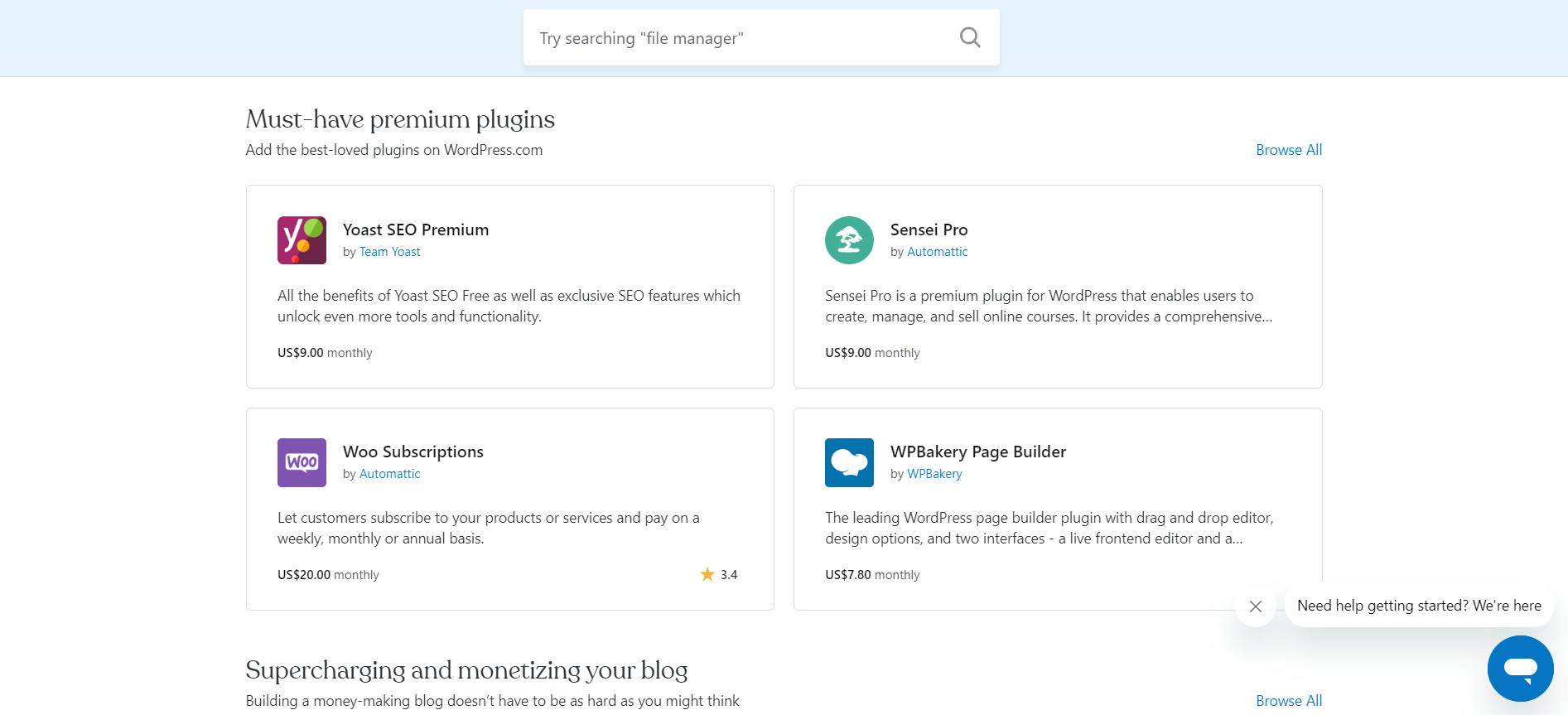
Marketing Features
Design FunctionalitiesRepresents how well each platform allows for creative design and customization of websites.Score Components:
- Template Variety (30%): Range and quality of design templates.
- Customization (30%): Flexibility and options for design alterations.
- User Interface (20%): Ease and intuitiveness of the design process.
- Responsiveness (10%): Adaptability to different devices and screen sizes.
- Innovation (10%): Unique design features and tools.
 8.0
8.0
 7.1
7.1
🏆
Overall Winner: WordPress
. WordPress stands out for its extensive customization options and a wide range of plugins for SEO, email marketing, blogging, social media integration, analytics and reporting, and ads and promotions. Sellfy, while offering a user-friendly interface and a comprehensive set of tools for managing, marketing, and scaling online businesses, lacks blogging features.

|

|
|
|---|---|---|
|
SEO Tools |
|
|
|
Email Marketing |
|
|
|
Blogging |
|
|
|
Social Media Integration |
Plugins for direct linking, automatic posting, and social feeds display |
Yes |
|
Analytics and Reporting |
In-depth analysis via plugins like Google Analytics for WordPress |
Yes |
|
Ads and Promotions |
Support for Google Ads and ad management through various plugins |
Yes |
Customer Support
Customer supportEvaluates the quality and availability of support options.Score Components:
- Response time (40%): Speed of support responses.
- Support quality (30%): Effectiveness and helpfulness of the support.
- Availability (20%): Range of support channels (phone, chat, email).
- Resource richness (10%): Quality of self-help and educational materials.
 5.0
5.0
 5.8
5.8
🏆 Winner: Sellfy
. In the comparison of WordPress vs Sellfy, Sellfy takes the lead with a higher customer support score. Sellfy offers 24/7 customer support, ensuring that users can get assistance at any time, although it is limited to email support and a knowledge base for self-service. This round-the-clock availability is a significant advantage for users who may need help outside of regular business hours.
WordPress, on the other hand, does not provide direct customer support due to its open-source nature. Users must rely on community forums, the WordPress codex, and support from hosting providers or plugin and theme developers. While this decentralized support system can be effective, it may not offer the immediate assistance that some users require, especially those new to the platform.
Security
SecurityLooks at the platforms’ security measures and data protection.Score Components:
- Data protection (40%): Safeguards for user and customer data.
- SSL and encryption (30%): Implementation of secure connections.
- Compliance (20%): Adherence to industry security standards.
- Regular updates (10%): Frequency of security updates and patches.
 6.7
6.7
 7.2
7.2
🏆
Winner: Sellfy
. Sellfy takes the lead in security with a score of 7.2, compared to WordPress’s 6.7. Sellfy’s security measures are designed to protect sellers and their digital products from unauthorized access, fraud, and piracy. These measures include secure payment processors, unique download links for each purchase, limited download attempts, and additional tools like PDF stamping to deter content sharing.
WordPress, on the other hand, provides numerous functionalities and resources to enhance website security. However, the effectiveness of these measures can vary depending on the hosting provider. Despite this, WordPress offers a variety of plugins to bolster security, such as those for site backups, monitoring, malware scanning, user activity tracking, permission control, and spam protection tools.
AI Capabilities
AI capabilitiesMeasures the effectiveness of AI-driven features and tools.Score Components:
- Automation efficiency (40%): Impact of AI on streamlining processes.
- Personalization (30%): AI-driven customization for users or customers.
- AI-Assisted design (20%): Role of AI in website design and functionality.
- Data analysis (10%): Use of AI in interpreting user data and analytics.
 6.1
6.1
 0
0

|

|
|
|---|---|---|
|
AI Builder |
AI Site Builder and Zita plugins available |
|
|
AI Ecommerce |
AI plugins like Conversios, Ochatbot, AI Power, GetGenie, Woowoo, WooCommerce Multilingual, and SEO plugins such as Rank Math and Yoast SEO available |
|
|
AI Content Generation |
AI Engine, GetGenie for content writing, and AI Power: Complete AI Pack plugins available |
|
|
Additional AI Features |
Wide range of AI powered plugins and tools available |
|
🏆 Winner: WordPress
. WordPress, with a score of 6.1, utilizes AI mainly through its plugins. It offers AI website builders like AI Site Builder and Zita, AI ecommerce plugins like Conversios, Ochatbot, AI Power, GetGenie, Woowoo, WooCommerce Multilingual, and SEO plugins such as Rank Math and Yoast SEO, and AI content generation plugins like AI Engine, GetGenie for content writing, and AI Power: Complete AI Pack.
Sellfy, on the other hand, does not have any AI capabilities.
User Management
User ManagementAssesses the platforms’ capabilities in managing user roles, permissions, and accessibility.Score Components:
- Role Customization (40%): Flexibility in creating and defining user roles and
permissions. - Ease of Management (30%): User interface and tools for managing users.
- Access Control (20%): Effectiveness of access control measures for different user
levels. - Scalability (10%): Ability to manage a growing number of users efficiently.
 8.8
8.8
 2.0
2.0
🏆 Winner: WordPress
. WordPress offers a comprehensive user management system with different roles and access levels, while Sellfy does not support adding multiple users or staff to a single account.
WordPress User Roles and Access Levels:
| Role | Description | Access Highlights |
|---|---|---|
| Super Admin | Manages the entire network in WordPress Multisite. | Network admin, manage sites, users, plugins, themes. |
| Administrator | Full access within a single site. | Manage plugins, themes, users, all posts/pages. |
| Editor | Manages and publishes content, including others’ posts. | Edit/publish all posts, manage comments, categories. |
| Author | Publishes and manages their own posts. | Write, edit, publish own posts, upload files. |
| Contributor | Writes and edits their own posts but cannot publish. | Write, edit own posts (no file uploads or publishing). |
Sellfy User Management:
Sellfy does not support adding multiple users or staff to a single account. This can be a limitation for businesses that require multiple users to manage their website or online store.
Additional Features

|

|
|
|---|---|---|
|
SSL Certificate |
|
|
|
Custom Domain |
|
|
|
Free Custom Domain Included |
|
|
|
International Domains |
|
|
|
Mobile Responsive |
|
|
|
Page Speed |
|
|
|
Website Builder Mobile App |
|
|
|
Convert a Website To An App |
|
|
|
Website Analytics |
|
|
|
Multilingual Sites |
|
|
|
Multiple Users |
|
|
User Feedback
WordPress receives praise for its user-friendliness, cost-effectiveness, extensive themes and plugins, customization options, and supportive community. However, users mention technical challenges, security concerns, a learning curve, and a lack of direct support. Overall, it remains a widely used and versatile platform, especially beneficial for startups and small businesses.
The user feedback on Sellfy highlights its strengths in providing an efficient, compact online store setup that caters to specific needs with affordable pricing, including a 14-day trial period to familiarize users with the product. Many appreciate its user-friendly interface, internal marketing tools, and customization options, which enable sellers to tailor their storefronts to their brand, along with integrations for payment processing like PayPal and Stripe. However, criticisms include issues with mobile site speed, a desire for clearer insights, limitations on customization, and some customer service inefficiencies.
The making of this blog
We followed a clear, step-by-step process to write and research this article.
FAQ
Which platform is better for ecommerce, WordPress or Sellfy?
Can I use WordPress and Sellfy for informational or business websites?
How do WordPress and Sellfy compare in terms of ease of use?
What are the main differences in website editors between WordPress and Sellfy?
Which platform offers better customer support, WordPress or Sellfy?
How do WordPress and Sellfy handle website security?
Are there AI capabilities in WordPress and Sellfy?










